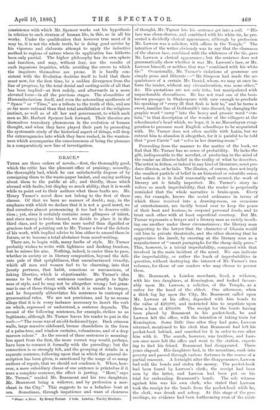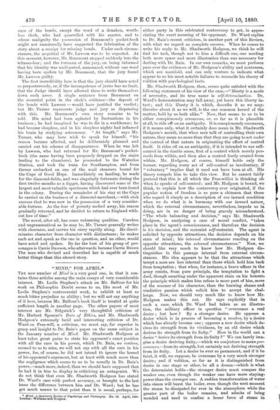GRACE.* THERE are three orders of novels,—first, the thoroughly good,
which the critic has the pleasant office of praising ; secondly, the thoroughly bad, which he can satisfactorily dispose of by consigning them to the waste-paper basket, and saying nothing about them to the public at all ; and thirdly, those which abound with faults, but display so much ability, that it is worth while to point out to their authors what those faults are. Mr. Henry Turner's novel does not belong to the first of these classes. Of that we have no manner of doubt ; nay, in the emphasis with which we declare that it is not a good novel, we find ourselves almost pronouncing it too bad to deserve criti- cism; yet, since it certainly contains some glimpses of talent, and since mercy is twice blessed, we decide to place it in the third class, and to perform the more useful than dignified or gracious task of pointing out to Mr. Turner a few of the defects of his work, with implied advice to him either to amend them in future, or to become a total abstainer from novel-writing.
There are, to begin with, many faults of style. Mr. Turner probably wishes to write with lightness and dashing freedom, but he misses his aim. Nothing, indeed, is easier than to pass, whether in society or in literary composition, beyond the deli- cate pale of that sprightliness, that unembarrassed vivacity, which all men and women feel to be charming, into that jaunty pertness, that habit, conscious or unconscious, of taking liberties, which is objectionable. Mr. Turner's idea seems to be that short sentences conduce greatly to light- ness of style, and he may not be altogether wrong ; but gram- mar is one of those things with which it is unsafe to tamper, and he frequently abbreviates his sentences in contempt of grammatical rules. We are not precisions, and by no means allege that it is in every instance necessary to. insert the verb on which, expressed or understood, a sentence depends. The second of the following sentences, for example, strikes us as legitimate, although Mr. Turner leaves his reader to put in the verb :—" The room was of an-old-fashioned type. Dark crimson walls, large massive sideboard, bronze chandeliers in the form of a palm-tree, and window curtains, voluminous, and of a deep maroon colour." As the second of these sentences is meaning- less apart from the first, the more correct way would, perhaps, have been to connect it formally with the preceding ; but the connection is so strongly felt, and the grouping of details in a separate sentence, following upon that in which the general de- scription has been given, is sanctioned by the usage of so many authors of repute, that we should not condemn it. When, how- ever, a mere subsidiary clause of one sentence is printed as if it were a complete sentence, the effect is jarring. "Here," says Mr. Turner," resided Mr. Beaumont and his two daughters. Mr. Beaumont being a widower, and by profession a mer- chant in the City." This suggests to us a helmless boat at sea. Sometimes, through impatience and want of clearness * Grace: a Novel. By Henry Turner. 2 vols. London : Tinsley Brothers. of thought, Mr. Tyner lets his sentence get into a coil. "His face was clean-shaven, and combined with his white tie, he pre- sented a decidedly clerical appearance, although by profession Mr. Lawson was a solicitor, with offices in the Temple." The intention of the writer obviously was to say that the cleanness of the shaven face, combined with the whiteness of the tie, gave Mr. Lawson a clerical appearance ; but the sentence does not grammatically show whether it was Mr. Lawson's face, or Mr. Lawson himself, or neither, that was "combined with his white tie." Occasionally, Mr. Turner's violations of grammar are simply gross and illiterate :—" Mr. Simpson had made the ac- quaintance of a certain Mr. Daniel, whom, we may at once in- form the reader, without any circumlocution, was none other," &c. His quotations are not only trite, but manipulated with unpardonable slovenliness. He has not read one of the best- known passages in Shakespeare with care enough to preclude his speaking of "every ill that flesh is heir to," and he turns a sweet, familiar line of Goldsmith's into discord, by changing the graphic word " carry " into the heavy and prosaic word "con- tain," in that description of the wonder of the villagers at the schoolmaster's head which, we hope, it is no Macaulayan exag- geration to presume most English schoolboys to be acquainted with. Mr. Turner does not often meddle with Latin, but we entreat him to abandon it altogether, for it is painful to be told that "poor Carrie" sat "soles in her drawing-room."
Proceeding from the manner to the matter of the book, we find that Mr. Turner has no sense of probability. He lacks the gift, indispensable to the novelist, of producing in the mind of the reader an illusive belief in the reality of what he describes. The artist in fiction, or indeed in any kind of literature, must pro- duce illusion, or he fails. The illusion, of course, does not imply the smallest particle of belief in an historical or scientific sense, but unless it is in itself reasonably well secured, the work of literary art is fatally imperfect. Mr. Turner's story in- volves so much improbability, that the reader is perpetually reminded that the whole narrative is brain-spun. Every one, for example, knows the social ordinance in terms of which those received into a drawing-room, on occasions of entertainment, are tacitly bound over to keep the peace of their host and hostess, to suspend personal feuds, and to treat each other with at least superficial courtesy. But Mr. Turner represents a lawyer and a literary man as rudely insult- ing one another under these circumstances ; the literary man suggesting to the lawyer that the character of Glossin would Cuit him in private theatricals, and the other showing that he appreciates the insult, by sneering at the literary man as a manufacturer of "smart paragraphs for the cheap daily press." This, however, is a trivial improbability, compared with that involved in the main incident of the novel. We can indicate the improbability, or rather the leash of improbabilities in question, without destroying the interest of Mr. Turner's two volumes, for those of our readers who may choose to peruse them.
Mr. Beaumont, a London merchant, lived, a widower, with his two daughters, at Kensington, and looked favour- ably upon Mr. Lawson, a solicitor, of the Temple, as a suitor for the hand of the eldest. One afternoon, when a thick fog lay upon the City, Mr. Beaumont called upon Mr. Lawson at his office, deposited with him bonds to the value of £20,000, and instructed him to negotiate upon them a loan of £10,000. The receipt for the bonds having been placed by Beaumont in his pocket-book, he and Lawson left the office, with the intention of taking train for Kensington. Some little time after they had gone, Lawson returned, mentioned to his clerk that Beaumont had left his pocket-book behind, and searched for it in order to run after him with it. The search, however, was fruitless, and Law- son once more left the office and went to the station, expect- ing to find his friend. Beaumont had disappeared. Three
years elapsed. His' daughters had, in the meantime, sunk into poverty and passed through various fortunes in the course of a
partial reascent. A fortnight after the disappearance, Lawson had sold the bonds and stolen the money. The pocket-book had been found by Lawson's clerk ; the receipt had been seen by the latter, and Lawson had been put on his trial for embezzling Beaumont's bonds. The sole witness
against him was his own clerk, who stated that Lawson took the receipt for the bonds from the pocket-book while he, the clerk, was drunk and asleep. At this stage of the pro- ceedings, no evidence had been forthcoming even of the exist-
ence of the bonds, except the word of a drunken, worth- less clerk, who had quarrelled with his master, and to whose malignity the possession of Beaumont's pocket-book might not unnaturally have suggested the fabrication of the story about a receipt for missing bonds. Under such circum- stances, the acquittal of Mr. Lawson was to be expected. At this moment, however, Mr. Beaumont stepped suddenly into the witness-box ; and the foreman of the jury, on being informed that his identity was undisputed, announced, without one word having been spoken by Mr. Beaumont, that the jury found Mr. Lawson guilty.
The first incredibility here is that the jury should have acted so preposterously, or, if the incompetence of juries has no limit, that the Judge should have allowed them to write themselves down such asses. A single sentence from Beaumont on the essential point in the clerk's evidence—the deposit of the bonds with Lawson —would have justified the verdict; but Mr. Turner represents judge and jury as dispensing with this. Mr. Beaumont's own story remains to be told. His mind had been agitated by fluctuations in his business ; he had imagined he was to die in a workhouse ; he had become sleepless, and in his sleepless nights had inflamed his brain by studying astronomy. "At length," says Mr. Turner, who may here wish to speak for himself. "his reason became affected, and he deliberately planned and carried out his scheme of disappearance. When he was left by Lawson, who had returned for Mr. Beaumont's pocket- book (the same having been purposely dropped on the stairs leading to the chambers), he proceeded to the Waterloo Station, and took the train for Southampton, and from thence embarked on one of the mail steamers bound for the Cape of Good Hope. Immediately on lauding, he made for the diamond-fields, and was singularly fortunate during the first twelve months as a digger, having discovered some of the largest and most valuable specimens which had ever been found in the colony. During the remainder of his stay at the Cape he carried on the business of a diamond-merchant,—with sUch success that he was now in the possession of a very consider- able fortune. As the fear of poverty melted away, his reason gradually returned, and he decided to return to England with- out loss of time."
The novel, after all, has some redeeming qualities. Careless and ungrammatical as he may be, Mr. Turner generally writes with clearness, and carries his story rapidly along. He discri- minates character from character with distinctness ; he makes each act and speak as the one in question, and no other, would have acted and spoken. By far the best of his group of per- sonages is Carrie Dawson, who afterwards became Carrie Brown The man who devised and described her is capable of much better things than this absurd story.



































 Previous page
Previous page